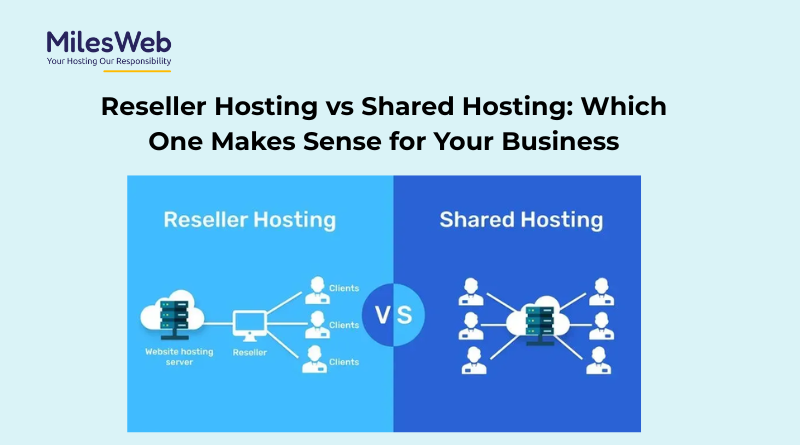“Which hosting plan should I go for, reseller hosting or shared web hosting services?”
This is the biggest question you will face while choosing a web hosting plan for your business. Both of them have their perks, but also include some pitfalls. So, evaluate your business goals, and find out the right web hosting plan to build the brand and to shape an entire digital journey.
Shared Hosting is regarded as the affordable starting point in the hosting world; user-friendly and suitable for smaller websites. In contrast, the best reseller hosting allows you to operate your tiny hosting business, complete with servicing client websites that can generate revenue. However, higher control comes with higher obligations. This blog post will discuss each type of hosting, analyze its advantages and disadvantages, and assist you in identifying which one matches your business goals.
Key Differences Between Shared Hosting vs Reseller Hosting
Purpose and Audience
Shared Hosting: It is designed for individuals or small businesses requiring simple and cost-effective ways to build an online presence. It is crucial for hosting personal blogs, portfolios, or small business websites that don’t require advanced scalability or customization. Since the server resources are shared among multiple users, the maintenance cost is minimal and it is ideal for beginners with limited technical knowledge.
Reseller Hosting: This is for entrepreneurs or agencies looking to offer hosting solutions to others. It allows you to create and manage multiple cPanel accounts under one umbrella. It lets you act as an independent web hosting provider. If you’re a web developer, digital marketer, or someone exploring a recurring revenue stream, Reseller Hosting opens up new doors to monetization and brand-building.
Control and Customization
Shared Hosting: Your reach and control with shared Hosting are severely limited. Server-level adjustments cannot be made since the user is locked into the hosting provider’s environment. For basic requirements, this structure works well. Still, in cases where more sophisticated options such as separate environments, complete branding removal, or white labeling services are needed, Shared Hosting will always fall short.
Reseller Hosting: It offers much greater flexibility and scalability. Client’s plans can be crafted according to their needs, resources can be allocated strategically, and even personal branding can be added. Such control gives the freedom and flexibility to not only address particular client requirements, but also expands business stature as a reputable hosting service provider. This augments credibility as well as customer trust.
Account Management
Shared Hosting: With this, you get a single cPanel account to manage all your websites. There’s limited flexibility, and all your resources are pooled together under one account, which may affect performance if one site consumes more than its share.
Reseller Hosting: It provides WHM (Web Host Manager) access to create multiple individual cPanel accounts for different clients or projects. This gives you better organization, control, and security, as each client’s site operates in isolation.
Technical Control
Shared Hosting: In shared Hosting, the web hosts manage the server’s backend operations like updates, security patches, and performance tuning. You have limited access and can only control what’s inside your cPanel account.
Reseller Hosting: It gives you more technical flexibility through WHM, where you can configure hosting plans, allocate resources, suspend or unsuspend accounts, and manage security settings. It provides a balance between control and convenience for managing multiple users.
Revenue Generation
Shared Hosting: You cannot rely on shared Hosting for income unless you create a commercially supported site. It’s designed for individual shoppers or small companies that want to sell online.
Reseller Hosting: It is designed to support businesses. It’s possible to have numerous hosting plans, accept customer payments, and count on a regular monthly income. Anyone wanting to begin hosting or digital services can do so with little initial investment.
Wrap Up
So, ultimately shared hosting and reseller hosting are two different types of Hosting solutions meant for two different types of users. Shared Hosting is a simple, friendly way to get your site into the top of searches. The good thing is that it is easy to install, cheap and has enough features to work for simple – middle range website at least. But it’s not versatile or scalable enough for people managing several sites and wanting to enter the web hosting business.
On the other hand, reseller hosting is an intelligent decision for web developers, digital agencies, and future hosting business people. It offers the power and tools to manage multiple client accounts under your brand. Reseller Hosting is the future to make recurring income, provide value-added service and gain reasonable control over the hosting environment. It’s simply a matter of what you’re trying to achieve — creating an online portfolio or running a full-blown web hosting business.

